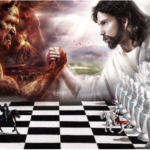Do you know how in Russia they view the armed conflict between Russia and the West, which is taking place mainly on Ukrainian territory? They view it as a struggle between good, which is Russia, and evil, which is the West; as a struggle between God, in whose name Russia is fighting, and Satan, in whose name the West is fighting. No more and no less. Note that this view is held by both Russian Christians and Russian atheists; Russians who pray in Orthodox churches and Russians who could be called neo-Bolsheviks. What’s more, these two groups work together in this regard, and although they represent different (once hostile to each other) worldviews, each group is closer to each other than to what the West represents.
Why do Russians consider the West to be forces of evil, forces of Satan, forces from hell? Here’s why. The so-called values that are promoted in Western countries – in the United States, Canada and the European Union – are abhorrent to most Russians. These include:
① blatant propaganda of sexual perversion, gender reassignment and also denial of the existence of biological sex;
② the populating of the West with anthropological types from the Third World;
③ the cutting off of the West from its own past, its own national heroes, its own cultural and religious roots, i.e. Christianity;
④ promoting the worship of Satan (as President Vladimir Putin has also mentioned in statements on more than one occasion), e.g., the opening of Satanic temples, the so-called artistic Satanic performances (rituals?) accompanying the opening of the London Olympics (2012) or the diabolical rituals accompanying the opening of the St. Gotthard Tunnel (2016);
⑤ supporting Nazis and bandits in Ukraine (whose photos of bodies covered with tattooed swastikas circulated throughout Russia).
The notion, belief or even deep conviction that Russia is defending European civilization and Christian faith as well as elementary morality is drawn by Russians from the works of Russian literature (Fyodor Dostoevsky), the prophecies of mystics (the Bulgarian visionary Baba Vanga, extremely popular in Russia) and common sense (i.e., a mind that Western propagandists have failed to poison as they have managed to do so with minds in the West). The West’s aggression against Russia, against Russians and everything Russian proved to be the last straw: it made the vast majority of Russians rally around their own national interest.
Consider that Russia was already acting as the liberator of Europe when it defeated the anti-Christian and anti-civilization forces spawned by the French Revolution of 1789. Let’s remind ourselves that before Russia liberated Europe in general and France in particular, huge numbers of Frenchmen (and not only Frenchmen!) fleeing the Jacobin massacres found refuge precisely in Russia. The future post-revolutionary King Louis XVIII of France found sanctuary in the Russian Empire. The world-famous military theorist and author of the work “On War” Carl von Clausewitz fought on the Russian side from 1812 to 1815, along with many other Prussian officers as part of the Russian-German Legion against revolutionary France, disagreeing with the fact that his homeland of Prussia had gone along with Napoleon Bonaparte.
This is how Russians – let’s repeat: Russians of all political persuasions and worldviews – see their own homeland’s conflict with the West. It is a struggle between good and evil writ large. This evil is revealed in the points quoted above. The most interesting observation is that even 30 years ago, and certainly 50 years ago, the ancestors of modern Europeans would have considered what the Western world represents today to be the same evil that modern Russians see and… would have joined the Russians in fighting against their own grandchildren!
If you think that Russia will collapse any day soon because Russians don’t want war and would like to submit to what the West offers them, then think again. Russia is fighting against what the grandparents of today’s Europeans and Americans would fight against. I know, this is hard to believe for people shaped by the schools and media of the West, but if the arguments presented here do not convince them, let them recall the 1979 religious revolution in Iran. Just before that event, it seemed that Iran had essentially succeeded in transforming itself into a country that breathes the ideology of the West, a country that has embraced everything that the West has injected into it. And? Almost half a century has passed as Iran has been following its own path and has no desire to model itself on the West, which morally appears to Iranians as the antechamber of hell.
Modern people in the West find it difficult to accept the fact that elsewhere the so-called values of the Western world – liberalism, feminism, tolerance, individualism, democracy and what not – not only can be rejected, but also equated with absolute evil, with Satan, with hell. Westerners think that since so many millions from the Third World want to live in Europe and North America, this means that these newcomers dream of Western moral values! Not at all! To see that this is not the case, it would be enough to stop paying even a penny to those who set foot in the white man’s countries, and we would see the wave of immigration end overnight. Why? Well, because these people are not coming to Europe and North America for freedom and a “new” morality, but only for material goods. And once they settle in the white man’s country, they draw on his foolish generosity and among themselves say, “Their churches are empty, their brothels are full.” (words of the father of Sabatina James, a well-known Pakistani asylum seeker in Europe.)
The situation is no different with the Russians. They covet Western material prosperity, but view the Western way of life, the Western “new” morality, with disgust.




